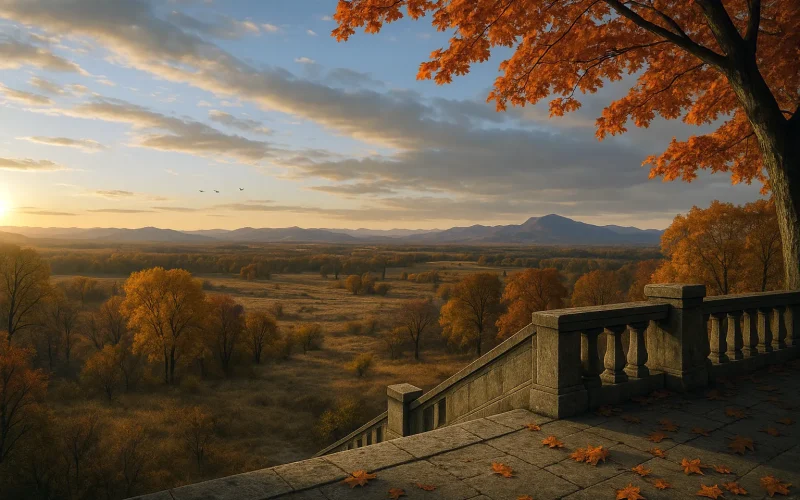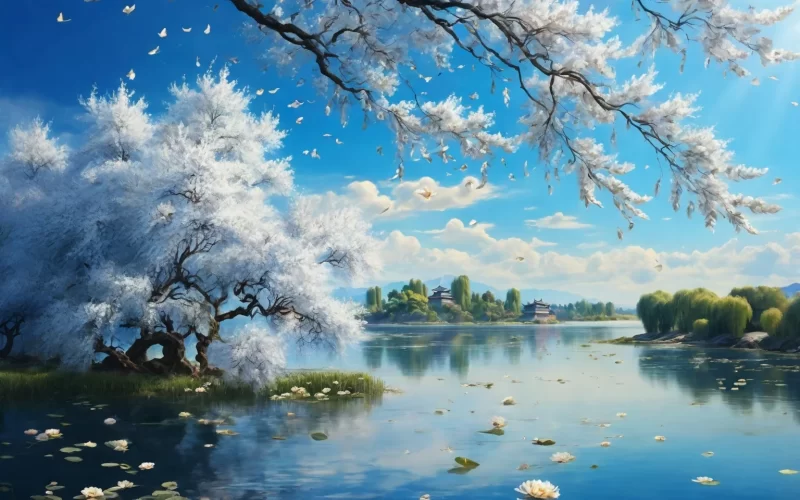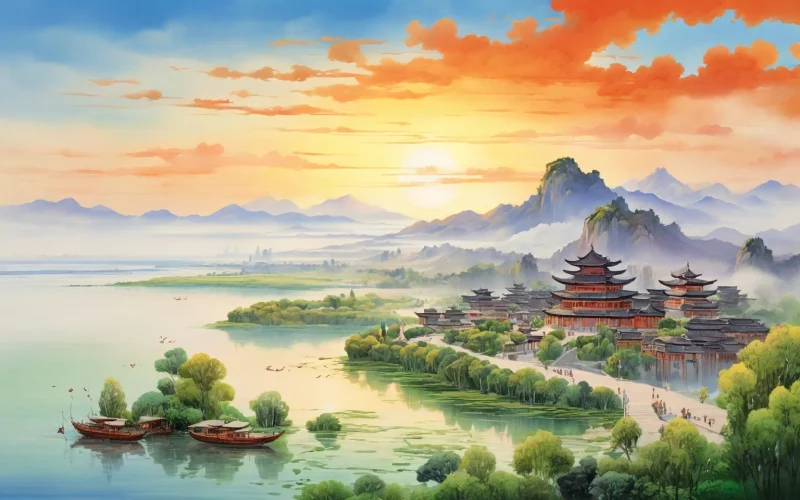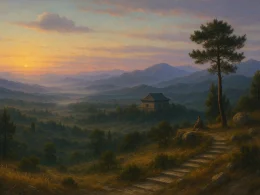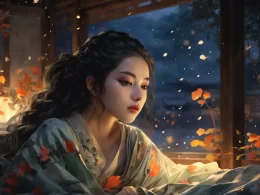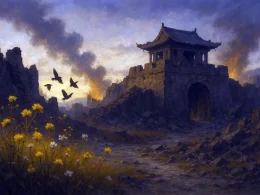Gone with yellow chrysanthemums last year,
You come back when cicada's song I hear.
Your soughing wakes me from dreams at midnight,
A year's wrinkles are seen in mirror bright.
Steeds missing frontier grass with bristles rise;
Eagles longing for clouds open sleepy eyes.
I'll gaze my fill into the boundless sky;
Though ill, for you I'll mount the tower high.
Original Poem
「始闻秋风」
刘禹锡
昔看黄菊与君别,今听玄蝉我却回。
五夜飕飗枕前觉,一年颜状镜中来。
马思边草拳毛动,雕盼青云睡眼开。
天地肃清堪四望,为君扶病上高台。
Interpretation
Composed in Liu Yuxi's later years shortly after returning from exile, this poem reveals an undimmed spirit despite advancing age and physical decline. Using autumn wind as its central motif, the work expresses the poet's unyielding ambition and tenacious pursuit of ideals through personification, scenic depiction, and lyrical expression. The verses convey profound autumnal sensations and steadfast belief in life's vitality, showcasing a dynamic aesthetic that soars with indomitable spirit.
First Couplet: 昔看黄菊与君别,今听玄蝉我却回。
Xī kàn huáng jú yǔ jūn bié, jīn tīng xuán chán wǒ què huí.
Last year we parted by golden chrysanthemums you saw / Now hearing dark cicadas, I return by nature's law
The poet ingeniously personifies the autumn wind as a sentient "I" while addressing himself as "you," creating a unique imagery of reunion between wind and man. "Golden chrysanthemums" and "dark cicadas" precisely mark seasonal transition between late and early autumn, infusing natural phenomena with emotional warmth and poetic resonance.
Second Couplet: 五夜飕飗枕前觉,一年颜状镜中来。
Wǔ yè sōuliú zhěn qián jué, yī nián yán zhuàng jìng zhōng lái.
The fifth watch's soughing wakes me by my bed / My mirror shows a year's aging on my head
Transitioning from the wind's return to personal contemplation, these lines capture temporal flow through sensory experience. The waking to wind sounds leads naturally to confronting mortality in the mirror, transforming autumn wind into a symbol of time and life's passage.
Third Couplet: 马思边草拳毛动,雕眄青云睡眼开。
Mǎ sī biān cǎo quán máo dòng, diāo miǎn qīng yún shuì yǎn kāi.
Warhorses twitch manes longing for frontier grass / Eagles unshutter eyes to scan blue skies they'll pass
Here the poem surges with vitality through metaphorical imagery. The restless horses and awakening eagles symbolize undimmed warrior spirit and unfulfilled ambition. These animal responses to autumn's call mirror the poet's own undying vigor, elevating the poem's emotional pitch.
Fourth Couplet: 天地肃清堪四望,为君扶病上高台。
Tiāndì sùqīng kān sì wàng, wèi jūn fú bìng shàng gāo tái.
In heaven-earth's crisp clarity, views expand / For you I climb the tower, though ill I stand
Despite physical infirmity, the poet ascends the tower to meet the wind, demonstrating resolute will and genuine love for autumn. The "for you" echoes the opening "you," creating structural harmony while blending tender sentiment with heroic spirit. The concluding image of gazing afar in autumn's clarity symbolizes enduring aspiration.
Holistic Appreciation
"Ode to the Autumn Breeze" is a masterfully crafted regulated verse that weaves emotion and scenery through its wind motif. The poem progresses from quiet reflection to dynamic aspiration, creating powerful artistic tension. The opening establishes a bidirectional emotional connection between wind and man, imbuing nature with consciousness. The middle couplets transition from sensory experience to symbolic imagery, expanding personal awareness into universal life force. The finale's tower ascent merges autumn's purity with human fortitude.
In minimal verses, Liu Yuxi captures autumn's essence and his own unyielding late-life stance. The concise language resonates with depth, the restrained emotion pulses with sincerity, and the ingenious structure flows with natural grace. This work transcends seasonal ode to become a symphony of poet's soul harmonizing with nature.
Artistic Merits
- Innovative Personification: The wind becomes a conscious interlocutor in "I-you" dialogue, creating fresh lyrical perspective
- Seasonal Precision: "Chrysanthemums," "cicadas," "frontier grass" and "blue skies" vividly delineate autumn while carrying emotional weight
- Dynamic Rhythm: The progression from reflective awakening to spirited animal imagery culminates in heroic tower-climbing
- Circular Structure: The opening "you" and closing "for you" form perfect bookends, demonstrating meticulous composition
Insights
This poem teaches that at any life stage, we can emulate Liu Yuxi's clear-eyed passion toward time's passage. The autumn wind symbolizes change, aging and return, yet becomes for the poet an awakening force and emblem of inner fortitude. Even with illness and graying hair, one can climb heights with aspiration. The "old steed in stable" spirit represents not just life's portrait but indomitable will. True aging lies not in physical change but in spiritual surrender - with autumn wind in heart, we may always gaze afar from life's towers, our heroic sentiments undimmed.
Poem translator
Xu Yuanchong (许渊冲)
About the poet

Liu Yuxi(刘禹锡), 772 - 842 AD, was a native of Hebei. He was a progressive statesman and thinker in the middle of the Tang Dynasty, and a poet with unique achievements in this period. In his compositions, there is no lack of poems reflecting current affairs and the plight of the people.





